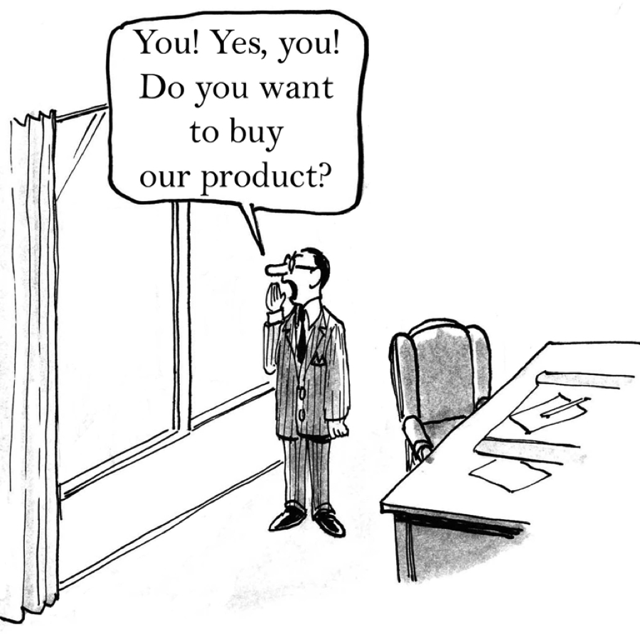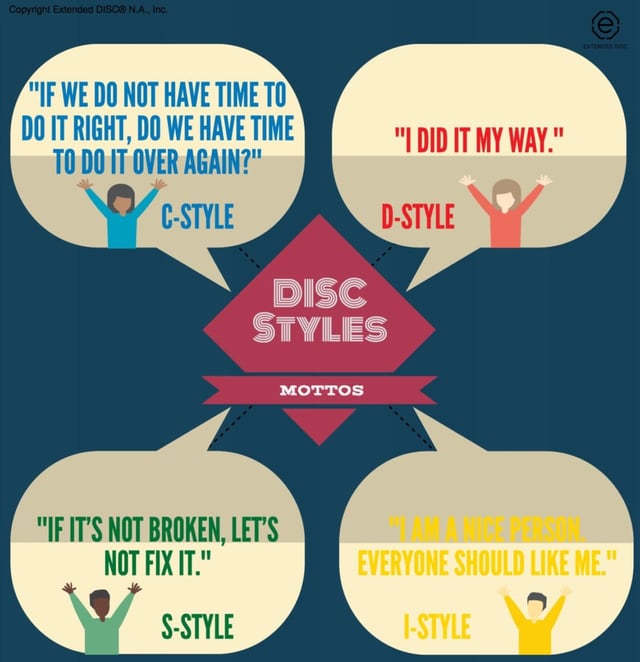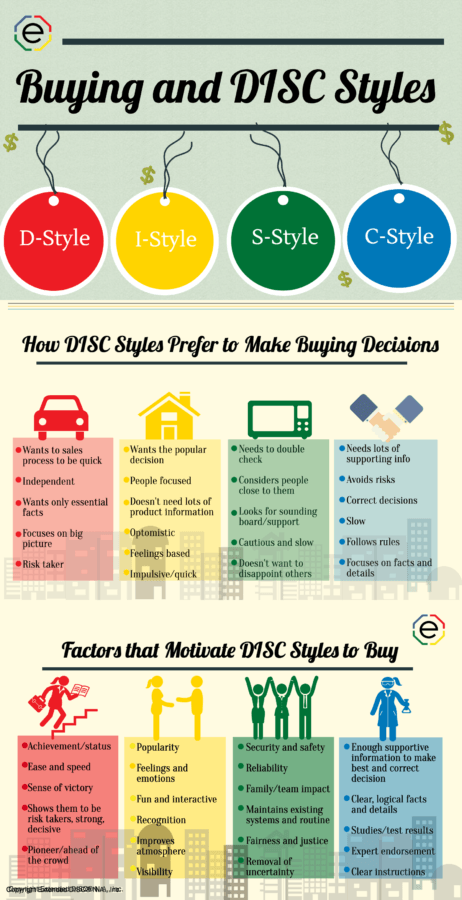Recognizing that DISC personality types make different buying decisions is necessary in order to move the sales process forward with our prospects.
How DISC personality types make different buying decisions is critical, but so is knowing how our own DISC personality style plays into the sales interaction. We are focusing on buying decisions as one part of an overall strategy to improve our style adjustments to close the deal.
How DISC personality types make decisions is just one component in the sales process
How DISC personality types make different buying decisions is a continuing discussion of our sales webinar series. The previous topic was Using DISC Profiles in Selling: How Understanding DISC Can Close a Deal. First, we focused on how DISC can help in selling. Logically the next step is to focus on how DISC styles make buying decisions.
While top sales professionals focus on how to communicate with and how identify prospects, they do not always identify how their prospects make decisions. In addition, they can overlook how their own decision-making style impacts the sales process. This is not a sales training program, but some insights on how DISC can enhance our sales technique. Mastering the sales technique is not limited to the sales professional. Regardless of our career, we will find ourselves using sales techniques, for example, to sell our project to our managers or promote new ideas to our team.
Why do we need to adjust our selling style?
Sales is a very competitive profession. Unfortunately, while there are many excellent sales professionals out there who are continually working to improve their skills and gain a competitive edge, there are many sales people who don't make the effort to improve. There's a guy at the car dealership who loves to play tennis. When he was young he would play for hours every day. He stills loves to play, but when asked how is tennis game is he quickly responds, "I'm terrible!". His skills went away, even though he has played all his life, because he didn't have time to practice. The story is just a quick reminder of how we need to keep building our skills in order to stay on top of the game.
We cannot keep repeating the same behaviors over and over. We need to adjust our selling style to meet the needs of our prospects. In order to do that, we must first understand the different DISC types of our prospects. Next, we need to know our own preferred selling style then we need to identify the DISC personality type of our prospect. Now we can adjust our selling style.
Why focus on decision-making when it comes to how DISC personality types make different buying decisions?
Ultimately, selling is about getting the prospect to make a decision. That decision does not always end in a purchase, but we need to move the sales process forward. The worst thing that happens in the sales process is a lack of a decision because then we are not sure how to move the sales process forward.
We typically have one chance in selling to a prospect. When something doesn't work then chance will most likely open up for another sales person. You may have to wait until your competitor makes a mistake to have another chance with that prospect. In other areas we may have a chance to catch up, but in selling you need to be aware and on top of your game all the time.
 We tend to assume our prospect makes the same buying decision the same way we do. We often overlook how important our decision-making style and the prospect's decision-making style are. Selling is all about making decisions. We need to think about how to make the decision-making process easier. For example, C-profiles make decisions based on facts. They will take a longer time because they want to make the correct decision. If we are not aware of the C-profile's decision-making style then we may lose the sale. The odds are against you that your prospects shares the same DISC profile as you.
We tend to assume our prospect makes the same buying decision the same way we do. We often overlook how important our decision-making style and the prospect's decision-making style are. Selling is all about making decisions. We need to think about how to make the decision-making process easier. For example, C-profiles make decisions based on facts. They will take a longer time because they want to make the correct decision. If we are not aware of the C-profile's decision-making style then we may lose the sale. The odds are against you that your prospects shares the same DISC profile as you.
Pressure impacts the sales process
Sales people can feel nervous or pressured to make the sales or close the deal. When we feel strong emotions, it affects how we communicate, motivate, and move the sales process forward. Strong emotions cause us to not modify our behaviors and we fall back on our most comfortable ways of doing things. Pressure leads to "auto-piloting".
We can also auto-pilot when we get comfortable in our role. When we are success, in our comfort zone, we can also auto-pilot. We can get over-confident and may not have the same motivation to keep modifying. Successful sales people can stop their growth because they are not as focused or present, or stop identifying prospect's DISC type. We can keep repeating the same behaviors that can stop us from reaching higher levels of success.
Where should we start to understand how DISC personality types make different buying decisions?
How DISC personality types make different buying decisions is critical, but so is knowing how our own DISC personality style plays into the sales interaction. We are focusing on buying decisions as one part of an overall strategy to improve our style adjustments to close the deal.
First, we can start by looking at our own decision-making style. Most of us have a general understanding of our decision-making style, but we may lack a deeper understanding of how they truly make decisions. The DISC profile assessments include a section on a person's decision-making style. For example, if you are a sales person who is not naturally going to check every detail when making decisions under pressure, but your prospect does, then adjustments would need to be made.
Pressures and pre-conceived notions of the sales profession
Many people have pre-conceived notions of sales people and it's typically more of a negative perception. We have probably though of the sales people as talkative, pushy, and slick. The sales person's job is that much harder because they need to overcome this stereotype.
Prospects feel pressure as well, especially in more important, higher risk or unfamiliar buying decisions. In these cases they are more likely to revert back to their natural styles. As sales people, we can only control own behavior. We cannot change or control the behavior of the prospect. Prospects feel a heightened sense of control in the sales process. Your prospects have little motivation to change their behavior. They decide if they want to purchase or not, but it's our job adjust our style appropriately. If we can help make the prospect's decision-making more comfortable or easier then we can keep the sales process moving forward.

How do the 4 DISC types make buying decisions
When we talk about S-styles they tend to be slower and they consider how the decisions impact the people around them. C-styles are also slower, but they want to make the correct decision. I-styles are very optimistic. All styles make decisions emotionally, but the I-styles are more emotional to begin with. They enjoy the buying process. D-styles don't want too much information. They want to make the decision quickly and easily.
Fears when DISC personality types make different buying decisions
Another way to think about how DISC personality types make different buying decisions is to think about the 4 DISC types and their fears. The S-style fears disappointing others. If you are talking to the C-style then talk about the critical factors that needs to get correct with this sales decision. D-styles always want to be in charge of the decision-making process. For the I-style, you want to address how the decision impacts how they are seen by others. You are dealing with their objections and stalls up front. You are identifying what might be holding them back. If you bring them up as a sales person then you are now setting yourself apart because you are talking about important issues that are relevant to the prospect.
Tips when focusing on how DISC personality types make different buying decision
How DISC personality types make different buying decisions is critical, but so is knowing how our own DISC personality style plays into the sales interaction. We are focusing on buying decisions as one part of an overall strategy to improve our style adjustments to close the deal.
A good tip for quickly identifying the 4 DISC types is to think about people you know and associate one person with each DISC profile. Think of a family member who is a strong C-profile and how they typically purchase. Is there a person you know who is a strong D-profile? Think about how they typically make buying decisions. This helps you quickly understand how the 4 DISC types buys things.
Frustrations of DISC types can derail the sales process
Sales people, without realizing it, can actually get in the way of the sales process. When the sales person does not recognize the differences in the prospect's style and their own, then the prospect may get frustrated. So if the sales person doesn't make the needed changes then, even if you have the correct product for the prospect, they won't buy.
D-styles are frustrated by slowness. You need to move at their pace even if you think they are moving recklessly or too quickly. Let D-style prospects buy the way they want to buy if the product is a good fit. Your indecisiveness or slowness can get in the way of the sale. S-styles need to think about how the purchase impacts everyone else. You can ask them questions that help them look at the decision from different angles, but avoid time constraints. Think about building trust, being more patient and giving them time to decide.
You will need to give the C-style as much information as possible. They get frustrated by surprises. Do not make up stuff. If you don't have the answer then let them know that you will find out and get back to them later. For the I-style they want to have fun and avoid formality. Give the I-style time to interact even if you have to stay on time.
Overusing our style and questions DISC types tend to ask
Remember that when the prospect is aware of your different styles and becomes uncomfortable then we may feel more pressure. When the prospect is pressured and we are pressured then we tend to fall back more on our natural style. In essence, we start to overuse our style and that gets us into trouble.
DISC works in all human interactions. We can reframe it to apply to specific roles and settings like selling. Another tool we can use to help us identify a prospect's styles is to look for those patterns of behaviors. Think about what types of questions they ask. D-styles prefer to ask questions like, "what's the bottom line?" I-styles like to ask question like "Who's going to be using that?" S-styles ask questions like" how does this product impact the organization? The C-styles will ask questions like, "why does it work that way?" The why, what, how, and who questions can help us identify our prospects styles.
Next steps in using the DISC tool to gain the competitive edge
In order for us to keep our edge as sales professionals, we need to practice DISC and to debrief after our sales interactions. First we practice understanding how DISC personality types make different buying decisions. Prospects are different and so are we.
When we begin to debrief after each sales interaction we can understand the process better and interact with the next prospect more effectively. We need to think about the interaction we just completed. What style did I identify for the prospect? Was I accurate in identifying the prospect's style? Did I make it easier for the prospect to make a buying decision? Was there something I could have done better to move the sales process forward? Debriefing after the sales call or meeting is the best time to practice and make it more of a habit. The more you practice and the more comfortable you are with this part of the sale, the more energy you will have to focus on other aspects of your selling process.
